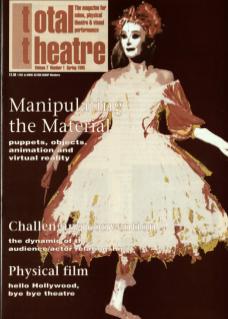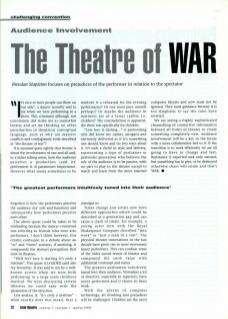‘It's nice to have people out there on our side’, a dancer recently said to me when we were performing in a show. This comment, although not uncommon, did strike me as somewhat bizarre and set me thinking on other peculiarities in theatrical conceptual language, such as why are massive conflicts and conflagratory strife described as ‘the theatre of war’?
It is assumed quite rightly that theatre is about the involvement of one and all and, in a ticket selling sense, how the audience perceives a production (and its performers) is of paramount importance. However, what seems sometimes to be forgotten is how the performers perceive the audience (its role and function) and subsequently how performers perceive each other.
The above quote could be taken to be misleading because the dancer concerned was referring to friends who were also performers. I don't think, however, this creates confusion in a debate about an ‘us’ and ‘them’ scenario; if anything, it compounds the abstract perceptions that exist in theatres.
‘Well let's face it darling it's only a matinee.’ This quote is loaded (and also my favourite). It was said to me by a well-known actress when we were both performing in a large-scale children’s musical. We were discussing certain liberties we could take with the parameters of the direction.
Let’s analyse it; ‘it's only a matinee’. what exactly does this mean, that a matinee is a rehearsal for the evening performance? Or one must pace oneself perhaps? Or maybe the audience in matinees are of a lesser calibre, i.e. children? The contradiction is apparent, the show was specifically for children.
The greatest performers intuitively tuned into their audience.
‘Let’s face it darling...’ is patronising (she did know my name), arrogant, and obviously delivered as if it's something one should know and no two ways about it. It's such a cliché in style and delivery, representing a type of performer or particular generation who believes the role of the audience is to be passive, with no part to play in the theatre except to watch and learn from the more talented amongst us.
Times change and artists now have different approaches which could be described as a generation gap and can cause a clash of ideals. For example, a young actor now with the Royal Shakespeare Company described ‘skin work’ as ‘just a man in a suit’. The physical theatre innovations in the last decade have given rise to more movement-based performers. This can confuse some of the older sacred tenets of theatre and compound the snob value with subliminal contempt and status.
The greatest performers intuitively tuned into their audience. Nowadays a lot of directors, especially in repertory, have never performed and it shows in their work. With the advent of computer technology, all thinking and prejudices will be challenged. Children are the most computer literate and now must not be ignored. They need guidance because it is too simplistic to say the roles have reversed.
We are seeing a highly sophisticated channelling of connective information between all forms of theatre to create something completely new. Audience involvement will be a key to the future with a more collaborative feel to it. If the transition is to work efficiently we are all going to have to change and fast. Resistance is expected and only natural, but something has to give, or be destroyed, otherwise chaos will ensue and that's WAR.

